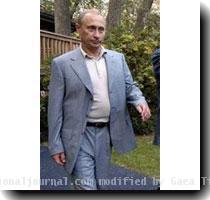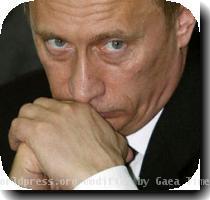Russian president scolds ruling party over regional elections, says acted undemocratically
By Irina Titova, APSaturday, November 21, 2009
Russia president criticizes ruling party over vote
ST.PETERSBURG, Russia — Russia’s President Dmitry Medvedev on Saturday sharply criticized officials in the ruling Kremlin-backed party for manipulating recent regional votes, saying it must learn to win fairly.
Medvedev’s statement marked a rare criticism of the United Russia party led by his predecessor and mentor, Prime Minister Vladimir Putin. United Russia is a power base for Putin, who has not ruled out a return to the presidency in 2012.
Speaking before a major party meeting in St. Petersburg also attended by Putin, Medvedev accused some of United Russia’s regional branches of using their dominance and official connections to shape the election results in their favor.
He said the party must “free itself of such people and shed such bad political habits.”
“Elections must express the people’s will in free competition between ideas and programs, but they turn into a different story when democratic procedures are mixed with administrative ones,” he said. He did not elaborate.
Most top federal and regional officials in Russia are United Russia members, and the opposition has accused the party of using its leverage to rig the vote. Independent election observers and opposition parties, including the Communists, protested what they said were mass electoral violations during October’s local elections, citing evidence of multiple voting and ballot stuffing.
Opposition candidates claim they were hindered from campaigning and some were denied places on the ballot.
“Democracy isn’t for parties, either ruling or opposition ones, it’s for the people,” Medvedev said. He added on a softer note that United Russia is strong enough to retain its dominance without undermining democratic standards.
“It’s necessary to modernize the party, make it more flexible and open,” Medvedev said. “You must learn to win in open struggle.”
Both Putin and Medvedev previously defended United Russia in post-election comments, while adding that claims of violations need to be investigated and the culprits punished. Medvedev’s statement Saturday was likely aimed at deflecting criticism of the vote rather than challenging Putin’s dominance of Russia’s political landscape.
Police on Saturday detained 13 members of the National Bolsheviks, a banned leftist opposition group, as they were heading to the meeting to hand Medvedev a letter urging him to fire Putin, said Andrei Dmitriyev, a group leader.
He said the petition also voiced support for Medvedev’s modernization drive, urged the president to stop relying on United Russia and allow more political freedoms.
Since assuming the presidency last year, Medvedev has sought to cast himself as a more liberal-leaning politician than Putin, who rolled back many post-Soviet freedoms during his eight-year presidency.
But most observers point out that his call to liberalize has been limited to words rather than actions, and see Putin as the man who continues to call the shots.
Medvedev’s state-of-the-nation speech earlier this month focused on the need to shed Russia’s dependence on oil and gas exports and ease an inflated state role in the economy. It was interpreted by some analysts as a sign of his desire to distance himself from Putin and shed his legacy.
But Putin made similar calls for easing dependence on raw materials in his speech at Saturday’s congress and hailed Medvedev’s modernization goals.
Putin also took the credit for recent signs of economic recovery and pledged that his Cabinet would continue to support industries hit by the economic crisis.
He said that the government would continue to support the troubled carmaker AvtoVAZ. AvtoVAZ, Russia’s largest automaker, has seen demand for its Lada cars fall sharply in 2009 due to the economic downturn and plans to lay off a quarter of its 102,000 workers.
Putin offered to stimulate demand for new cars though an initiative similar to the U.S. “cash-for-clunkers” program. He said the government would offer 50,000 rubles (about US$,1800 or $1,200) to car owners willing to trade in their old vehicles for new Russian-made ones.
He said that Russia’s gross domestic product would fall by 8-8.5 percent this year, less than initially expected, and that the nation should regain the pre-crisis pace of growth in two or three years.
____
Associated Press writer Vladimir Isachenkov in Moscow contributed to this report.
Tags: Eastern Europe, Europe, Political Organizations, Political Parties, Russia, Saint Petersburg, St.petersburg, Vladimir Putin

